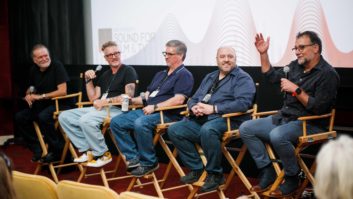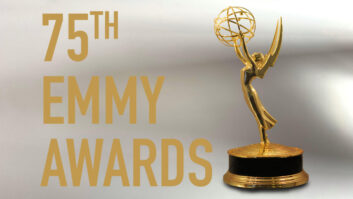New York, NY (February 5, 2018)—The third annual BroadwayCon, held in New York City at the end of January, once again provided theater fans with deep insights to what happens on the stage, as well as behind it. The panel “I Can Hear the Bells: Sound Design” promised a look into how a sound designer fills an empty theater to create a soundscape for a musical or play, but, because of its diverse group of panelists, wound up offering a deeper look into the world of sound for the stage.
The six-person panel featured two sound designers, two associate sound designers, and two audio engineers—all with serious Broadway cred—and revealed the working relationships between their titles. The panel members included:
· Scott Lehrer, sound designer, musicals — Hello, Dolly!; Carousel; The King and I
· John Gromada, sound designer, plays — Elephant Man; Amy and the Orphans
· Alex Neuman, associate sound designer — Hello, Dolly!; Carousel
· Alex Hawthorn, associate sound designer — Newsies, Aladdin
· Julie Sloan, engineer — Charlie and the Chocolate Factory; Jersey Boys
· Liz Coleman, engineer — The Band’s Visit; Amelie
Simply stated, the process starts with the sound designer building a sound system for a completely empty room—there are no house systems installed in the majority of Broadway theaters. The associate sound designers are responsible for actually building the system that the sound designer creates, and the engineers run the sound systems leading up to and during the shows.
For something seemingly easily explained, getting non-audio pros to understand what the team does is daunting. This was clearly evidenced in 2014 when the TONY Awards ended the Best Sound Design of a Musical and of a Play categories because members were not sure on how to judge them. Last April, it was announced that the TONYs had reinstated the Sound Design awards, in part because of a petition started by panel member John Gromada. They will return with the current Broadway season and be presented at the upcoming TONY Awards in June.
Fellow sound designer Scott Lehrer was happy to see the categories reinstated. “By taking away that award, there was a disrespect shown to our world,” he said. “That affected high school programs and college programs. People said ‘I don’t want to do that anymore. Why would I want to do a thing, that on a national program, they don’t have respect for?’ What we do has value and it is worthwhile to pursue this as a career.”
The collaboration between the team was further shown when a question was asked of the sound designers as to how often they revisit a show after it has opened, which was met with a sideways glance between the panel’s two sound designers, implying “not often.” But you can always count on the team in a pinch.
“This past fall, there was a problem with the console at Hello Dolly!,” says associate sound designer Alex Neuman. “I was in New Jersey and I got a call from the mixer. We were not going to have a show that night unless I got on a train. It turned out to be the sort of thing where we had to wipe the console and install a backup. Always back up your work.”
As far as the sound designer’s role after the show opens, “it totally depends on the show, the producer, the star and the engineer,” said Lehrer. “If you have an engineer that is rock solid and everyone trusts, [you check in] a few times a year to make sure things haven’t gone weirdly. A play is different because the levels are set on a play. On a musical, you are leaving it up to your engineer to mix the show. You write down some level numbers as a rough thing, but you don’t want to mix with numbers; you want to mix with your ear. And if you have been on a show for a long time, you get level drift where you can get louder or quieter depending on who you are as an engineer.”
Julie Clark spoke to being on a show for a long time, as she was the engineer for the duration of Jersey Boys’ decade-long run. “The first couple years were important for me to find my solid footing and keeping the show in the pocket where it wouldn’t drift,” she said. “A lot of people asked how could you stay on a show for that many years and asked if I was bored out of my mind. It never got boring to me. There are way too many variables on a daily basis for it to be boring. Finding your footing does take a bit and it gave me a grounding that I take with me on every show I do. I’m much quicker at finding the pocket where the show lives.”
When it comes to careers, sound designer jobs are not the easiest to come by, according to associate sound designer Alex Hawthorn. “It’s really hard,” he said, when asked about making the switch to sound designer. “There’s currently a ceiling where nobody is retiring, and so these guys are still doing Broadway shows and they’re always going to get the phone call before I do. And so you see the same names on every single Playbill doing shows.
“If I want to have a design career, I need to say no to associate work and yes to design work, but nobody wants to turn any work down because we’re all thinking that this might be the one that becomes the next Lion King.”
The question of gender equality was posed to engineers Julie Sloan and Liz Coleman, and they felt that women in the field aren’t being discriminated against, but rather that women aren’t finding their way into the profession.
“It’s not as if there are a pile of people that are being said no to,” said Sloan. “We don’t have enough people that are trying for the jobs. We’ve got to start earlier in getting the girls who are interested in science or music. We are missing the girls that are going to grow and become sound designers. When I started Jersey Boys in 2005, there were about six women around, and now there are seven women mixing on Broadway, which is great, but they aren’t sound designers.”
“I personally feel very strongly and I do what I can to encourage other women coming up,” added Coleman. “If you know women who want to do what I do, I will happily sit down and grab a cup of coffee or tea with them and talk to them, because I think it is important that we encourage women and minorities to do this because there isn’t the representation right now.”







